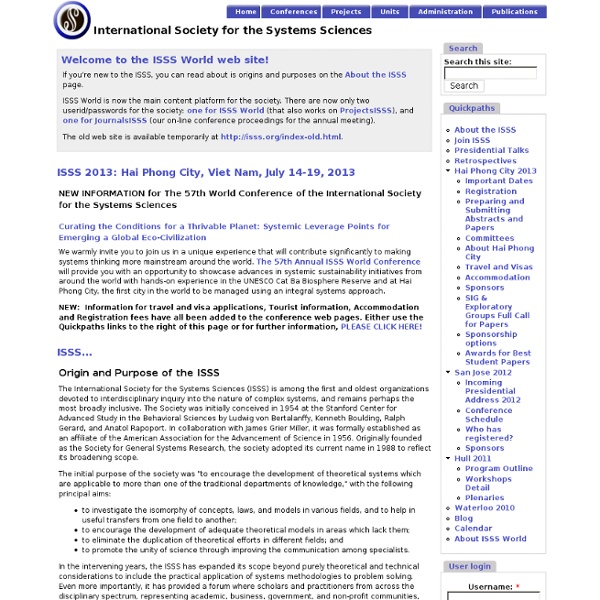Community Stations | San Mateo, California
Now you can listen to KCSM Jazz 91 anywhere you want. Download our app from iTunes or Android Market today. It's Free!
isss57.com
Academic Links | International Society for the Systems Sciences
This page lists academic institutions and research centers engaged in systems thinking and practice, and where available, those institutions who offer systems education programs. United States The Organization Systems Renewal® (OSR) Program at the Bainbridge Graduate Institute, Seattle, WA, USA The Organization Systems Renewal® program (OSR) of Bainbridge Graduate Institute in Seattle, Washington, is one of the foremost programs in the world offering graduate study in systems thinking, design and leadership. OSR is this year’s President’s Pick for our Academic Affiliates Program. OSR offers a graduate course of study that brings a distinct systemic approach to issues of adaptive leadership in organization contexts. Australia Systems Design and Complexity Management Alliance, Business School, The University of Adelaide, Australia We are living in a complex and ever changing world Policy makers, managers and leaders today are expected to cope with increasing complexity, change, and diversity.
science et francophonie
Discussion sur le thème L'usage du français en science à l'Université 1re partie Assemblée générale 1994. Relevé des cassettes magnétophoniques établi par Jacqueline Blanchard, spécialiste en Administration personnelle, juin 1994. Dans l’ordre de leur première intervention : Pierre Demers, Claudette Gariépy, Jean Carette, Paul Rémillard, Louis de Kinder, René Durocher, Jean-Claude Guédon, Jean Rémillard, Hector Poblete, Rodrigue Tremblay, Alice Derome, Gabrielle Cloutier, Léon Collet, Pierre Couillard, Louise Brouillet, Normande Alarie, Yvette Delliac, Michel Lapierre. Demers. Claudette Gariépy Gariépy. Donc ces grandes luttes syndicales-là n'ont pas été étrangères à l'adoption de la Charte de la langue française en 1977. Nous les travailleurs nous sommes un peu comme les sentinelles de la langue de travail. Autre ça bon, pourquoi on puisse dire pourquoi avoir exclu les universités? Donc premières victimes, pourquoi? Tout ça fait en anglais. Merci. Demers. Jean Carette français d'ailleurs.
Catalog Details Page
Written/Edited by: Steven E. Wallis 2011, ISBN 9780984216505 (125 pages), Emergent Publications Available Formats: Why do policies fail? In addition to providing intriguing directions for research, this book also suggests a bold new standard for evaluating policies. In a highly cynical time it is refreshing to see someone who still believes in the power of government for good. In this provocative book, Wallis takes on the complacency of sociologists and political scientists alike who continue to subscribe to conventional theory that has resulted in failed policies. In this small book Steve Wallis deals with the problem of how to avoid reduction of approaches used when studying social problems and policies to qualitative or quantitative methods. Steve Wallis belongs to a growing group of meta-scientists, people who are applying methods of core sciences to high-order mental constructs such as theories and policies.
School on Nonlinearity and Stochasticity in Emergent Phenomena
Organizers Lecturers Rafael Barrio. Instituto de Física, UNAM. Mexico Course description | HideNonlinear Physics in Complex Systems Carlos Gershenson. Holger Hennig. Pablo Padilla Longoria. Henrik Jensen. María Elena Lárraga. Sponsors
Systems Sciences
système dynamique
Définitions On trouve le mot « cybernétique » chez Platon (kubernhtikh) dans La République et Le Gorgias avec le sens donné aussi par André-Marie Ampère dans le second volume de son Essai sur la philosophie des sciences (1843). La signification actuelle du mot est proposée par Norbert Wiener (1894-1964, né aux Etats-Unis) dans Cybernetics or Control and Communication in the Animal and the Machine (1948) publié par Hermann et Cie, Paris avec The Technology Press (pour les droits) et John Wiley comme coéditeurs. Le mot « systémique » est une abréviation de « théorie des systèmes » dont l’origine se trouve dans la « théorie générale des systèmes », expression due à Ludwig von Bertalanffy (1901-1972, né en Autriche-Hongrie) qui l’a utilisée dès 1945 (Allgemeine Systemlehre). Les notions de cybernétique et de systémique ont trop de points communs pour retenir ici quelques rares divergences car les propos de ces pages veulent d'en développer les significations les plus couramment admises.
TriQuest Motorcycles & Sidecars URAL Dealer - TriQuest Motorcycles & Sidecars
Downward causation
In philosophy, downward causation is a causal relationship from higher levels of a system to lower-level parts of that system: for example, mental events acting to cause physical events,[1] The term was originally coined in 1974 by the philosopher and social scientist Donald T. Campbell.[2][1] See also[edit] References[edit] Further reading[edit] Campbell, Donald T. (1974) "Downward causation in hierarchically organised biological systems".
Complex Systems Summer School - Chile
Sponsored by Santa Fe Institute and Universidad del Desarrollo Zapallar, Chile November 11 - 21, 2013 Apply Now HERE CSSS-Chile is an intensive 11-day exploration of biocomplexity and the complex behavior in the environment and social sciences. The school is open to students from all countries. This is the first CSSS to be held in Chile. The school consists of a series of lectures by some of the world's top researchers in complex systems, people who have helped define the field and are pushing scientific boundaries. No tuition is charged. Application Requirements In addition to completing an online application: A current CV. To Apply Additional information regarding logistics, faculty, and program schedule can be found on the CCSSS wiki page.
Marin Fencing Academy



